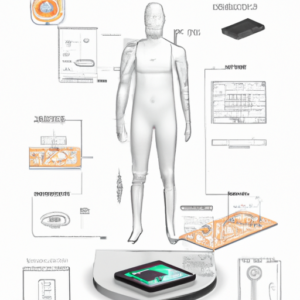Introducing Smart Body Scales – More Than Just a Number on the Scale
Hello there! If you’re reading this, it’s likely you have an interest in smart body scales or are considering purchasing one. First things first, let me tell you what smart body scales are. These are scales that do more than just tell you how much you weigh.
They’re equipped with sensors that measure your body composition, including your muscle mass, body fat percentage, bone density, and more. This information can be especially useful if you’re looking to lose weight or just want to maintain a healthier lifestyle.
Accurately Weighing In: The Lowdown on Smart Body Scale Precision
Let’s get real – one of the main reasons to invest in a smart body scale is to get a more accurate reading of your weight and other body composition metrics. But just how accurate are these devices? Well, it turns out there are quite a few factors that can impact the precision of a smart body scale’s measurements. Here are some things to keep in mind:
First off, it’s important to note that most smart body scales are not medically accredited, meaning they aren’t held to the same rigorous standards as professional medical equipment. That said, many still deliver reliable results for home use when correctly used and maintained.
One factor that can impact accuracy is the user’s hydration level. If you’re dehydrated, your body may hold onto more water, leading to a higher weight reading. On the flip side, if you’re well-hydrated, you may see a lower weight on the scale. This doesn’t necessarily mean the scale is inaccurate – just that weight fluctuates based on various factors.

Another source of error is body positioning. If you’re not standing squarely on the scale or your weight is distributed unevenly, you may get an inaccurate reading. Similarly, if you move around too much during the measurement process, the scale may struggle to get a clear reading.
To get the most accurate measurements possible, it’s important to follow the manufacturer’s instructions and make sure the scale is properly calibrated. Keep the scale on a flat, hard surface and take measurements at the same time of day under consistent conditions (such as before eating or after using the bathroom).
By taking these steps and being mindful of potential sources of error, you can maximize the accuracy of your smart body scale and get a clear picture of your body composition over time. Happy weighing!
Maximizing Accuracy with Smart Body Scales
Using a smart body scale can be a great way to keep track of your weight, body fat percentage, and other important health metrics. However, if you want to get the most accurate readings possible, it’s important to use your scale correctly and take steps to reduce the risk of errors.
Tips for Correctly Using a Smart Body Scale
First and foremost, it’s important to make sure that you’re following the manufacturer’s instructions correctly. This might mean stepping on the scale at a certain time of day, or standing in a specific position. It’s also important to use your scale on a hard, flat surface, as placing it on carpet or other soft surfaces can affect its accuracy.
Another tip for getting accurate readings is to weigh yourself at the same time each day. Our weight can fluctuate throughout the day, so it’s best to take measurements at a consistent time to get a more accurate picture of any trends over time.
Strategies for Improving Accuracy
In addition to following the correct usage instructions, there are a few other strategies you can use to improve the accuracy of your smart body scale. One is to make sure that you’re not dehydrated when you weigh yourself, as this can affect your weight and other measurements.
You can also take steps to ensure that your body is in a consistent state when you weigh yourself. For example, try to use the restroom before weighing yourself, and avoid eating or drinking for at least 30 minutes beforehand.
Finally, it’s worth noting that body composition can be affected by a number of different factors, including your diet, exercise routine, and genetics. While a smart body scale can be a useful tool, it’s important to remember that it’s just one part of the puzzle when it comes to improving your overall health.
Ready to Step Up Your Smart Scale Game?
After delving into the ins and outs of smart body scales, it’s clear that these devices are more than just a weight tracker. Smart scales measure a variety of body metrics and provide detailed insights into our health and fitness.
But accuracy is everything when it comes to these tools. Factors such as hydration levels, surface material, and positioning on the scale can have a significant impact on readings. To maximize accuracy, it’s important to follow certain steps and keep potential sources of error in mind.
Some tips for using a smart body scale correctly include taking measurements at the same time of day, standing still on the scale, and avoiding fluctuations in hydration levels. Strategies for improving accuracy include checking the surface of the scale, calibrating the device regularly, and utilizing the same user profile for consistent tracking.
While it’s important to keep accuracy in mind, smart body scales can be useful tools for tracking our progress and maintaining healthy habits. By understanding how to use them properly, we can gain valuable insights into our overall health and make informed decisions about our wellness journey.
So why not step up your smart scale game and see what you can learn about your health and fitness?